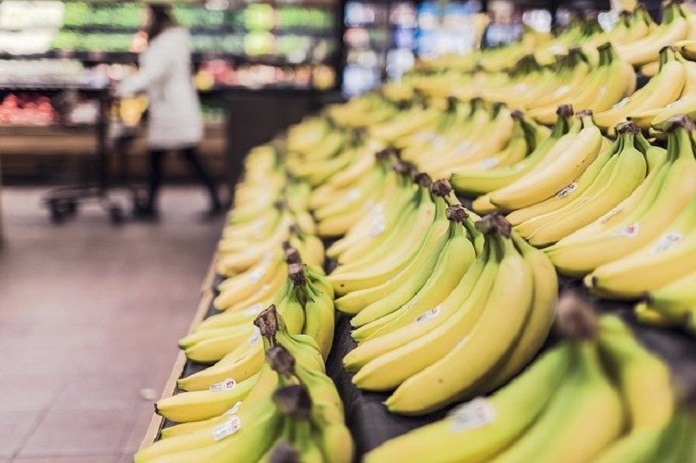Bananas are a delicious and affordable fruit that tastes great in a variety of dishes and baked goods.
Although some people avoid bananas due to their high levels of natural fruit sugars, they are a good source of a variety of vitamins and healthy carbohydrates.
Bananas have some unique health benefits, read on to find out how healthy bananas really are.
Potassium
Bananas are a great source of potassium.
One medium-sized banana contains about 425 milligrams (mg) of potassium. The Adequate Intake (AI) for potassium is between 2,600 mg and 3,400 mg for healthy adults.
This value is given by the National Institutes of Health, and the AI represents the intake that is assumed to ensure nutritional adequacy in the absence of an established Recommended Dietary Allowance (RDA).
Potassium is important because it is present all throughout the body and is essential for cellular function.
Vitamin C and Vitamin B6
Bananas are a great source of vitamin C and vitamin B6.
Vitamin C is important because it helps produce connective tissue, which plays an important role in healing injuries.
Vitamin C may also reduce the impact of oxidative damage by neutralizing free radicals; however, more research is needed to confirm this function.
Vitamin B6 can act as a coenzyme that helps catalyze over 100 metabolic reactions. These reactions are primarily involved in the metabolism of proteins and amino acids.
It also helps facilitate immune function and hemoglobin formation, which is the protein that carries oxygen through the bloodstream.
Fibre
Bananas are also a good source of fibre, which has a variety of physical and digestive health benefits.
Some studies have suggested that high dietary fibre intake is associated with a decreased risk of type 2 diabetes by helping the regulation of blood sugar levels and preventing insulin resistance.
A diet high in dietary fibre could potentially increase satiety levels in some people, which could help promote weight loss and healthy weight maintenance.
Green or ripe bananas?
There are many different types of bananas, and they each have unique benefits.
Green bananas, in particular, are a good source of resistant starch. This is a type of fibre that could potentially benefit digestive health by acting as a food source for good gut bacteria.
Since raw green bananas taste kind of bitter, studies on green bananas typically use green banana flour to determine its potential health benefits.
Green bananas are also used in a variety of delicious Caribbean recipes.
Ripe bananas, on the other hand, have a sweet and creamy taste, and they are higher in simple sugars. They are also a great source of fiber, potassium, and vitamins.
Their taste and texture make them a healthy substitute for some ingredients used in baked goods.
Since bananas are high in potassium, they could potentially be helpful in reducing high blood pressure as potassium relaxes the walls of the blood vessels. This increases the space inside the blood vessels, which decreases blood pressure.
Regular potassium intake could potentially benefit heart health; a variety of studies have suggested that there is a link between low potassium intake and a high risk of stroke.
More research is needed to determine if bananas themselves can help reduce this risk.
Bananas are a healthy source of a variety of nutrients, and they are a great way to help you get enough daily servings of fruits and vegetables.
References
Falcomer, A.M., Riquette, R.F., Romao de Lima, B., et al. (2019). Health Benefits of Green Banana Consumption: A systematic review. Nutrients 11(6): 1222. Doi: 10.3390/nu11061222
Gabica, M.J., Thompson, G., Romito, K., O’Brien, R. (2019 August 21). Michigan Medicine: The University of Michigan. Accessed 2021 February 1, from https://www.uofmhealth.org/health-library/abo9047
Harvard Health Publishing. (2017 January 23). Harvard Medical School. Accessed 2021 February 1, from https://www.health.harvard.edu/heart-health/potassium-lowers-blood-pressure
Potassium: Fact sheet for Health Professionals. (2020 June 3). National Institutes of Health Office of Dietary Supplements. Accessed 2021 January 29, from https://ods.od.nih.gov/factsheets/Potassium-HealthProfessional/
The Nutrition Source. N.d. Harvard T.H. Chan School of Public Health. Accessed 2021 February 1, from https://www.hsph.harvard.edu/nutritionsource/food-features/bananas/
Vitamin C: Fact sheet for Health Professionals. (2020 February 27). National Institutes of Health Office of Dietary Supplements. Accessed 2021 February 1, from https://ods.od.nih.gov/factsheets/VitaminC-HealthProfessional/ Weickert, M.O., Pfeiffer, A.F.H. (2018). Impact of Dietary Fiber Consumption on Insulin Resistance and the Prevention of Type 2 Diabetes. J Nutr 148(1):7-12. Doi: 10.1093/jn.nxx008.
Image by StockSnap from Pixabay



